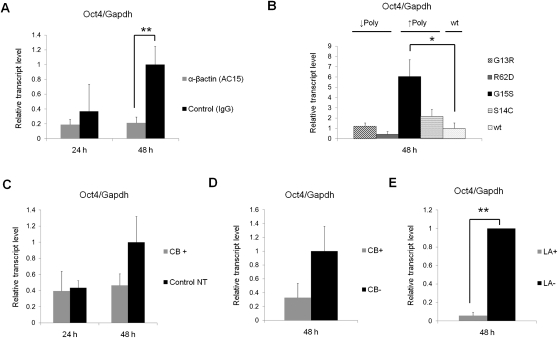Figure 2.
Nuclear actin polymerization is necessary for transcriptional reprogramming of Oct4. (A) Anti-βactin antibody injection (clone AC15) into GVs inhibits the transcriptional reactivation of Oct4 in NT oocytes. IgG was injected as a control. Relative fold increases of gene transcripts to control NT were measured by qPCR. Transcription was analyzed 24 h and 48 h after NT. Data represent mean ± SEM; (**) P = 0.0029; F and T-test against control, antibody injection: n = 8 at 48 h and n = 5 at 24 h; control injection: n = 4 at 48 h and n = 2 at 24 h. (B) Actin mutant expression influences transcriptional reactivation of Oct4 in NT oocytes. Several human actin mutants (G13R, R62D, G15S, and S14C) and human wild-type actin (wt) were expressed in oocytes, and these oocytes were used for NT. Transcript level is relative to control wild type. Data represent mean ± SEM; (*) P = 0.025; F and T-test against wild type, n = 6. (C) The effect of actin-depolymerizing reagent on Oct4 reactivation in NT oocytes. CB was added to culture medium at a concentration of 5 μg/mL during 48 h of culture. Data represent mean ± SEM; CB+: n = 10 at 48 h and n = 4 at 24 h; control: n = 11 at 48 h and n = 4 at 24 h. (D) Oct4 reactivation from transplanted nuclei is inhibited by depolymerizing nuclear actin with CB in oil GVs. Nuclei suspended in CB-containing solution (gray bar, CB+) or DMSO-containing solution (black bar, CB−) were injected into oil GVs, and transcriptional activation was examined by qRT–PCR analysis. Transcript level is relative to control CB−. Data represent mean ± SEM; n = 6. (E) Oct4 reactivation from transplanted nuclei is inhibited by depolymerizing nuclear actin with LA in oil GVs. Nuclei suspended in LA-containing solution (gray bar, LA+) or DMSO-containing solution (black bar, LA−) were injected into oil GVs. Data represent mean ± SEM; (**) P = 0.0016; F and T-test against LA−; n = 3.

